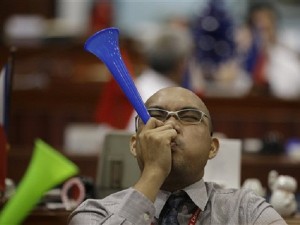PSE index continues record-breaking climb

A Filipino trader blows a horn during the first day of trading at the Philippine Stock Exchange in Makati on Wednesday, Jan. 2, 2013. The local stock index continued its record-breaking climb as it went past the 5,900 level on Thursday, buoyed by the upbeat sentiment of global markets that welcomed budget developments in the United States. AP/AARON FAVILA
The local stock index continued its record-breaking climb as it went past the 5,900 level on Thursday, buoyed by the upbeat sentiment of global markets that welcomed budget developments in the United States.
Also, the peso strengthened to its highest level in nearly five years as improved outlook on the global economy and favorable sentiment on the Philippines raised investors’ appetite for assets in emerging markets.
The local currency closed at 40.77 against the US dollar, up by 9 centavos from the previous day’s finish of 40.86:$1.
The last time the peso closed stronger than that of Thursday was on March 5, 2008, when it settled at 40.76 against the greenback.
The peso also hit an intraday high of 40.76:$1 Thursday, while the lowest recorded was 40.825.
Volume of trade amounted to $983.7 million—up from the previous day’s $931.8 million.
At the Philippine Stock Exchange, the main-share index surged by 73.06 points, or 1.25 percent, to close at a new high of 5,934.05. A new intraday peak of 5,960.74 was also reached.
Investors snapped up shares of PLDT, AC, BDO, SMIC and Megaworld.
Although PLDT rose at a faster pace, SM Investments kept its bragging rights as the most valuable stock in the bourse, with a market capitalization of P560 billion. PLDT ended Thursday with a market cap of P553.10 billion.
There were 121 advancers against 47 decliners while 43 stocks were unchanged.
“Events in Washington have played out pretty much exactly as we expected, with Congress compromising on a deal at the very last minute. The deal focused on the revenue side and did not address spending or, most importantly, the debt ceiling. This means there is much to do in the New Year,” said BofA Merrill Lynch in a commentary.
“The [fiscal] cliff is behind us, but now ‘three gorges’—the sequester, the debt ceiling, and the continuing resolution for the 2013 budget—all lie ahead,” it said.
The US budget deal, messy and protracted as it was, may have provided an immediate boost for financial markets, but it may spell over the long term for some Asian assets that are coming off a stellar 2012.
Investors may start to shift some money out of overpriced or crowded Asian investments in favor of the United States on the view that the fiscal deal has allowed the US to avoid a recession while it boosts the prospects for American stocks.
“In the short term, US risk premium will come down now that a deal has been struck and might trigger some reversal of flows from Asia back to the US,” said Hong Hao of Bank of Communication International Securities.
Analysts do not expect a major reversal of funds, but more of a subtle shift as some money managers rebalance their portfolios by taking profits on Asian positions and moving those funds into prospective bets in the United States.
The S&P 500 fell 1 percent from September through December last year in the buildup to the presidential election and the so-called fiscal cliff. At the same time, Asian markets rallied. Japan’s Nikkei rose 17.2 percent and the MSCI Asia Pacific ex-Japan index went up by 5.6 percent.
Southeast Asian markets such as Thailand and the Philippines were top performers last year, but a flood of funds has pushed valuations to levels that look less appealing now on a relative basis.
“There are a lot of great companies in Asean. But as a market, the region is looking pretty fairly valued,” said Bill Maldonado, who oversees about $80 billion as chief investment officer in Asia-Pacific for HSBC Global Asset Management.—With a report from Reuters
